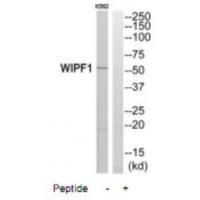
| WB | 咨询技术 | Human,Mouse,Rat |
| IF | 咨询技术 | Human,Mouse,Rat |
| IHC | 咨询技术 | Human,Mouse,Rat |
| ICC | 技术咨询 | Human,Mouse,Rat |
| FCM | 咨询技术 | Human,Mouse,Rat |
| Elisa | 咨询技术 | Human,Mouse,Rat |
| Aliases | WAS/WASL-interacting protein family member 1; Wiskott-Aldrich syndrome protein-interacting protein; WASP-interacting protein; PRPL-2 protein; WIPF1 |
| Entrez GeneID | 7456; |
| WB Predicted band size | 52kDa |
| Host/Isotype | Rabbit IgG |
| Antibody Type | Primary antibody |
| Storage | Store at 4°C short term. Aliquot and store at -20°C long term. Avoid freeze/thaw cycles. |
| Species Reactivity | Human |
| Immunogen | Synthesized peptide derived from C-terminal of human WIPF1. |
| Formulation | Purified antibody in PBS with 0.05% sodium azide. |
+ +
以下是3篇涉及WIPF1抗体的文献摘要,供参考:
---
1. **文献名称**: *WIPF1 promotes ovarian cancer progression by facilitating EMT through the PI3K/AKT signaling pathway*
**作者**: Li Y. et al. (2020)
**摘要**: 该研究利用WIPF1抗体进行免疫印迹和免疫组化分析,发现WIPF1在卵巢癌组织中高表达,通过激活PI3K/AKT信号通路促进上皮-间质转化(EMT),从而增强肿瘤侵袭和转移。
---
2. **文献名称**: *The role of WIPF1 in immune synapse formation and T cell activation*
**作者**: Anton I.M. et al. (2016)
**摘要**: 通过免疫荧光和共聚焦显微镜技术结合WIPF1抗体,研究发现WIPF1与WAS蛋白(Wiskott-Aldrich Syndrome Protein)相互作用,调控T细胞中免疫突触的肌动蛋白重组,影响T细胞受体信号传导。
---
3. **文献名称**: *WIPF1 deficiency causes a novel immunodeficiency syndrome characterized by recurrent infections and impaired neutrophil migration*
**作者**: Tsuboi S. et al. (2018)
**摘要**: 使用WIPF1抗体进行蛋白质表达分析,发现WIPF1基因突变患者的中性粒细胞中WIPF1蛋白缺失,导致细胞迁移功能缺陷,揭示了WIPF1在先天免疫中的关键作用。
---
如需更具体的文献信息(如期刊名称、DOI等),建议通过PubMed或Web of Science以关键词“WIPF1 antibody”或“WIPF1 function”检索最新研究。
The WIPF1 antibody is a research tool designed to detect and analyze WIPF1 (WAS/WASL-interacting protein family member 1), a key regulatory protein involved in cytoskeletal dynamics. WIPF1. also known as WIRE or WIP, binds to the Wiskott-Aldrich syndrome protein (WASP) and neural WASP (N-WASP), facilitating their activation and stabilization. These interactions are critical for actin polymerization, a process essential for cellular functions such as cell motility, membrane trafficking, and immune synapse formation. WIPF1 contains multiple functional domains, including an N-terminal WH1 domain for WASP binding and a C-terminal region coordinating interactions with signaling molecules like Cdc42 and Grb2.
Antibodies targeting WIPF1 are widely used in techniques like Western blotting, immunofluorescence, and immunohistochemistry to study its expression, localization, and interactions in various cell types. Dysregulation of WIPF1 has been implicated in immune disorders (e.g., Wiskott-Aldrich syndrome), cancer metastasis, and neurological conditions, making its detection crucial for understanding disease mechanisms. Researchers often validate these antibodies for specificity across species (human, mouse, rat) and applications, ensuring reliable detection of WIPF1 isoforms. Additionally, WIPF1 antibodies contribute to exploring therapeutic strategies targeting actin remodeling pathways, particularly in contexts like tumor invasion or immune cell dysfunction. Their utility spans basic research, biomarker studies, and preclinical drug development.
×